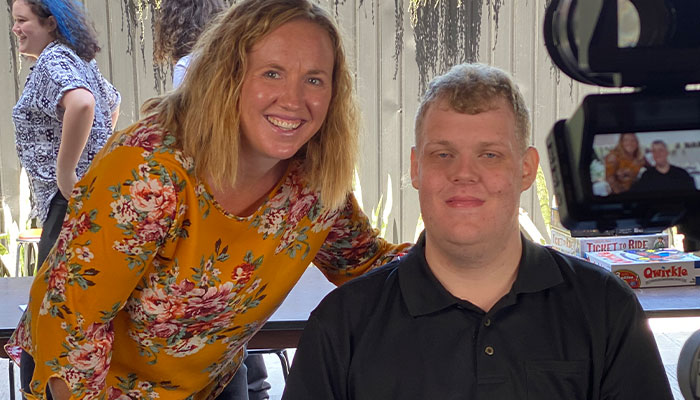Anyone who has been to 'Grooving with Sarah's' seated Zumba class, or taken part in a Jonathan Bridge interactive gaming quest, has been a happy, paying customer of a pilot program assisting aspiring entrepreneurs with intellectual disability to open their own businesses.
The Start Up program, and research into its effectiveness, is a collaboration between Macquarie University Business School, UTS, the University of Newcastle and Challenge Community Services (CCS) -- one of NSW’s largest providers of support and services for people with a disability.
Mentors and motivation
Start Up is a completely original program in which self-employed mentors with an intellectual disability work with motivated individuals to develop their small business idea or self-driven employment.
The mentors are uniquely familiar with the challenges any aspiring entrepreneur in this program might face.
What we have discovered is that having a disability can actually be an advantage in business ... you see things that other people don't see.
Professor Rebecca Mitchell from Macquarie Business School is part of the interdisciplinary research team that has also evaluated the success of the pilot program.
“A long-term issue for participants is meaningful employment as there is significant discrimination against people with a disability, particularly people with an intellectual disability. Despite ambition and skills, people with an intellectual disability are under-represented in self-driven businesses,” Mitchell says.
“Basically our aim with the program was to use this mentorship and the peer-led process to work with the participants to get them into the gig economy. What we have discovered is that having a disability can actually be an advantage in business ... you see things that other people don't see. Different perspectives lead to innovations.
- Fruit fly breakthrough puts killer mozzies on notice
- Zoom's a boon when it comes to helping kids learn to read
"Sarah’s Zumba class is actually seated so it’s fantastic for people who are recovering from injury, for people who may have a physical disability, or for people who are older. It’s never been done before and it’s a fabulous idea.
“For Jonathan, it’s about making games accessible. He’s used principles and techniques – real technology – to make them accessible.”
The Start Up program, and research into its effectiveness, was funded by the NDIS’s Information, Linkages and Capacity Building program under the direction of CCS Grants Coordinator Beth Innes, who was instrumental in developing the course.
Under the initiative, participants are given support in key business areas including developing their business plan, marketing and daily business management skills.
Award finalist
The program has been so successful that Start Up has been announced as a finalist in the 2020 Hesta Excellence Awards in recognition for its social and economic impact in the disability sector.

Game changer: Beth Innes, of Challenge Community Services, and young entrepreneur Jonathan Bridge, whose Start Up business involves making board games accessible.
A Newcastle pilot program has produced clear evidence that people with an intellectual disability can be successful in business if they have the right support in place.
Innes says the individual impact is significant and also helps to reduce stigma and discrimination which then has a flow-on effect to anyone with a disability.
We know that people with an intellectual disability face an unemployment rate of 34 per cent compared with 8 per cent for other disability.
“In addition to supporting self-driven employment for people with an intellectual disability, Start Up’s success has informed CCS’s advocacy for changes in NDIS funding policy, including moves to better allow people with a disability to determine when and how they are supported under the NDIS,” Innes says.
“We know that people with an intellectual disability face an unemployment rate of 34 per cent compared with 8 per cent for other disability and 5.2 per cent for the general population (prior to COVID-19).”
Full, productive lives
Mitchell, along with her colleagues Professor Bronwyn Helmsley (UTS) and Professor Brendan Boyle (UoN), says research shows that encouraging self-employment and entrepreneurship allows many people with an intellectual disability the opportunity to create full and productive lives.
“Our team of researchers aim to shine a light on the potential value of entrepreneurship for people with an intellectual disability in Australia. In addition to this social and policy impact, occupational psychology literature remains largely silent on the entrepreneurial experiences of people with a disability, and our Start Up research seeks to address this gap,” Mitchell says.
The pilot program has launched eight viable businesses so far and hopes to at least double that number next year.
The program is now being extended to another regional location in Tamworth with a view to rolling it out even more broadly.
Professor Rebecca Mitchell from Macquarie Business School is Associate Dean, Accreditation, Rankings and Business Intelligence.



